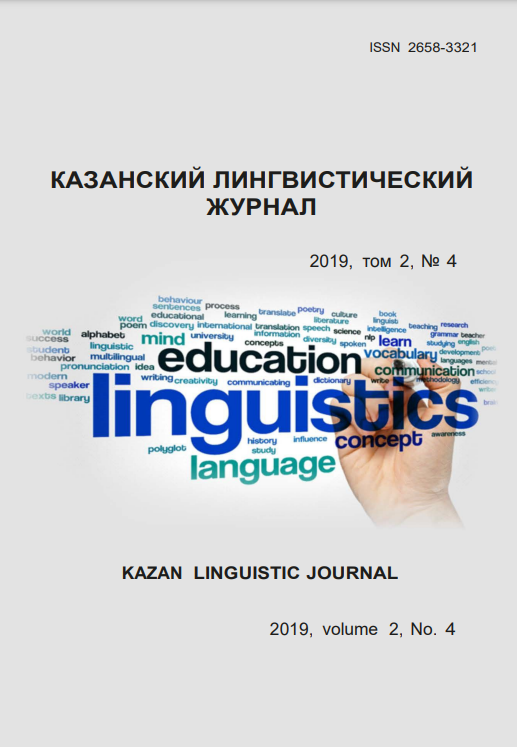The acquaintance with the culture of english-speaking countries while teaching foreign language
Keywords:
intercultural communication, teaching English, cultural aspectAbstract
The article is devoted to cultural aspect realization while teaching foreign language and topicality of the problem is proven by large amount of conferences on intercultural communication which are held and by the course on cultural studies and anthropology included in curriculum. The authors point out that it is necessary not only to make students know customs and traditions of English-speaking countries but also to develop the tolerance to all other cultures. Knowledge of cultural features is considered as the essential part of successful communication and this knowledge is thought to be highly important to solve some communicative tasks. The lesson on the topic “Learning to live in society” from Spotlight is given as an example of successful use of intercultural communication foundations while teaching English. However, the cultural aspect is significant during teaching language not only at school but also in universities.
References
Литература
Английские слова: употребляем правильно [Электронный ресурс] // URL:https://subscribe.ru/archive/job.lang.basicenglish.words/201201/24120325.html (дата обращения: 14.10.2019).
Базарова Л.В. К вопросу о соотношении языка и культуры // Образование и культура России в изменяющемся мире. Новосибирск, 2007. С. 72– 76.
Бебина О.И. Возможности формирования социокультурной компетенции учащихся на уроках английского языка «Просвещение иностранные языки» [Электронный ресурс] // URL:http://old.prosv.ru/attach/inyaz/inyaz_orenburg26 0118.pdf (дата обращения: 13.10.2019).
Ваулина Ю.Е., Дули Дж., Подоляко О. Е. Английский в фокусе 8 класс.
/ Ю.Е. Ваулина, О.Е. Подоляко, Дж. Дули М.: Просвещение, 2015.
Гребенникова О.А. Проектная деятельность как средство развития познавательных интересов старшеклассников: Дис. канд. пед. наук. [Текст] / О.А. Гребенникова. Великий Новгород, 2005. 181с.
Коряковцева Н.Ф. Теория обучения иностранным языкам: продуктивные образовательные технологии: учеб. пособие для студ. лингв. фак. высш. учеб. заведений / Н.Ф. Коряковцева. М. Издательский центр «Академия», 2010. 192 с.
Кретинина Г.В., Гончарова Н.А., Чуксина О.В. Межкультурная коммуникация и обучение английскому дискурсу // Высшее образование в России. 2007. № 8. С. 135– 136.
Поволяева А.Н. Язык – составная часть культуры. (Языковая картина мира, стереотип, гештальт) Электронный ресурс. / А.Н. Поволяева // URL: http://www.phg.ru/issuel6/fg6. htm. (дата обращения: 28 октября 2019)
Сайт новых и хорошо забытых слов Что-это-такое.ru [Электронный ресурс] // URL:https://chto-eto-takoe.ru/host (дата обращения: 14.10.2019).
Текст как явление культуры / под ред. Г.А. Антипова, И.Ю. Марковиной, О.А. Донских, Ю.А. Сорокина. Новосибирск: Изд-во НГУ, 1989. 340с
Фатеева И.А. Метод проектов как приоритетная инновационная технология в образовании // Молодой ученый. 2013. №1. С. 376 – 378.
References
Anglijskie slova: upotreblyaem pravil'no [English words: use correctly] // URL:https://subscribe.ru/archive/job.lang.basicenglish.words/201201/24120325.html (assessed: 14.10.2019). (In Russian)
Bazarova, L.V. (2007). K voprosu o sootnoshenii yazyka i kul'tury [About correlation of language and culture] // Obrazovanie i kul'tura Rossii v izmenyayushchemsya mire. Novosibirsk. S. 72– 76. (In Russian)
Bebina, O.I. Vozmozhnosti formirovaniya sociokul'turnoj kompetencii uchashchihsya na urokah anglijskogo yazyka «Prosveshchenie inostrannye
yazyki» [Opportunities of sociological and cultural competence formation in lessons of English language] // URL:http://old.prosv.ru/attach/inyaz/inyaz_ore nburg260118.pdf (assessed: 13.10.2019). (In Russian)
Vaulina, YU. E., Duli, Dzh., Podolyako, O.E. (2015). Anglijskij v fokuse 8 klass [Spotlight: 8th year], Moscow: Prosveshchenie, 216 p.
Grebennikova, O.A. (2005). Proektnaya deyatel'nost' kak sredstvo razvitiya poznavatel'nyh interesov starsheklassnikov [Project work as means of cognitive activity development in seniours]: Dis. kand. ped. nauk. [Tekst] / O.A. Grebennikova, Velikij Novgorod. 181 s. (In Russian)
Koryakovceva, N.F. (2010). Teoriya obucheniya inostrannym yazykam: produktivnye obrazovatel'nye tekhnologii [Theory of foreign languages teaching: productive educational technologies]: ucheb. posobie dlya stud. lingv. fak. vyssh. ucheb. zavedenij, Moskva: Izdatel'skij centr «Akademiya», 192 s. (In Russian)
Kretinina, G.V., Goncharova, N.A., Chuksina O.V. (2007). Mezhkul'turnaya kommunikaciya I obuchenie anglijskomu diskursu [Intercultural communication in English discourse teaching] // Vysshee obrazovanie v Rossii. № 8. S. 135-136. (In Russian)
Povolyaeva, A.N. Yazyk – sostavnaya chast' kul'tury. (Yazykovaya kartina mira, stereotip, geshtal't) [Language as a part of culture] // URL:http://www.phg.ru/issuel6/fg6. htm. (assessed: 28.10 2019) (In Russian)
Sajt novyh i horosho zabytyh slov Chto-eto-takoe.ru [The website of new and forgotten words What is it.ru] // URL:https://chto-eto-takoe.ru/host (assessed: 14.10.2019). (In Russian)
Tekst kak yavlenie kul'tury [Text as a cultural phenomenon] / pod red.
G.A. Antipova, I.YU. Markovinoj., O.A. Donskih, YU.A. Sorokina, Novosibirsk: Izd-vo NGU, 1989. – 340 s. (In Russian)
Fateeva, I.A. (2013). Metod proektov kak prioritetnaya innovacionnaya tekhnologiya v obrazovanii [Method of project work as innovative technology in education// Molodoj uchenyj. №1. S. 376– 378. (In Russian)






